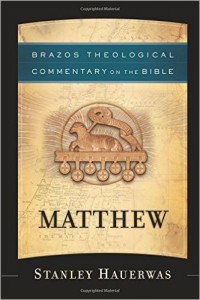 Hauerwas reads the story of Matthew chapter 2 as the intersection of “apocalyptic time” with “everyday time.” That is, the eternal intersects times, enters time, and transforms time. The time of the kingdom challenges the time of Herod.
Hauerwas reads the story of Matthew chapter 2 as the intersection of “apocalyptic time” with “everyday time.” That is, the eternal intersects times, enters time, and transforms time. The time of the kingdom challenges the time of Herod.
Herod is a pawn used by Rome to maintain order useful to Rome. Jesus is born in an occupied land, a small outpost, on the edge of a mighty empire. Jesus is eventually killed under Rome’s authority, and at the time his death will mean nothing to Rome. … Rome knew how to deal with enemies: you kill them or co-opt them. But how do you deal with a movement, a kingdom whose citizens refuse to believe that violence will determine the meaning of history? The movement that Jesus begins is constituted by people who believe that they have all the time in the world, made possible by God’s patience, to challenge the world’s impatient violence by cross and resurrection (37).
Too often the political significance of Jesus’ birth, a significance that Herod understood all too well, is lost because the church, particularly the church in America, reads the birth as a confirmation of the assumed position that religion has within the larger framework of politics. That is, the birth of Jesus is not seen as a threat to thrones and empires because religion concerns the private (38).
Such a privatised view of religion for Hauerwas, is anathema. That Matthew sets his story in the context of Herod indicates the public and political nature of Jesus’ life and ministry.
The gospel constructs an alternative world. It resists imperial claims. … The kingdom is not some inner sanctuary, but rather the kingdom is an alternative world, an alternative people, an alternative politics. That is what it means for Jesus to be an apocalyptic. He is, in his person and in his work, God’s embodied kingdom. The temptation for Christians in modernity is to equate the kingdom with ideals that we assume represent the best of human endeavour: freedom, equality, justice, respect for the dignity of each person. These are all worthy goals that Christians have every reason to support, but goals that are not in themselves the kingdom. To equate these ideals with the kingdom is to separate the kingdom from the one who proclaims the kingdom. …. “Jesus is Himself the established Kingdom of God” (Barth). Or in Origen’s classical phrase, Jesus is the autobasileia—the kingdom in person (38).
Thus the one born the King of the Jews is a present and enduring challenge to the existing king of the Jews—and to all worldly systems of power that dominate others and rule by fear. Over against a sentimentalised portrayal of the Christmas story, Hauerwas insists that
Jesus is born into a world in which children are killed, and continue to be killed, to protect the power of tyrants. … The Herods of this world begin by hating the child, Jesus, but as Frederick Dale Bruner observes, end up hurting and murdering children. That is the politics, the politics of murder, to which the church is called to be the alternative (41).
In earlier comments on chapter one, Hauerwas describes the politics of Jesus represented by the incarnation and set forth by Matthew:
Matthew’s gospel is about “the politics of Jesus,” which entails an alternative to the power politics of the world. … A right reading of the gospel requires…a community whose fundamental political act is the sacrifice of the altar. …A theological reading of Matthew, therefore, reaffirms that the church be an alternative politics to the politics of the world. … (29)
In more strictly theological terms, the political character of Jesus “the son of David, the son of Abraham” means that the person and work of Christ cannot be separated. That Jesus’s teachings have been separated from what some understand to be salvation reflects the accommodation of Christians to the world. The doctrine of the incarnation has unfortunately been used by an accommodated church to give itself the illusion it is faithful because it believes the right doctrine. But incarnation properly understood means that Jesus’s person and work cannot be separated because Jesus saves by making us participants in a new way of life. The name of that way of life is church (30).
An Advent Prayer
To you O Lord we bring our lives
Troubled, broken or at ease
A sacrificial offering
For you to use
Take away our selfishness
And teach us to love as you loved
Take away our sense of pride
And show us the meaning of humility
Take away our blindness
And show us the world through your eyes
Take away our greed
And teach us how to give as you gave
Show us your ways
Teach us your paths
That we might walk with you more closely
Our hand in your hand
Our feet in your footsteps
From the baby in a stable
To eternity, Amen
Read more at: http://www.faithandworship.com/prayers_Advent.htm#ixzz4S4RThRFF